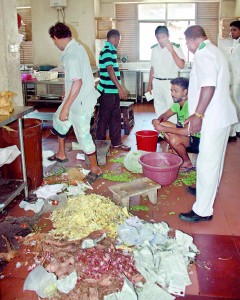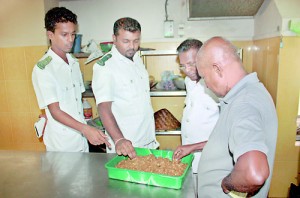News
Dead gecko’s remains in the ice-cream? Welcome to a ministry kitchen
A dead gecko in a refrigerator, unhygienic conditions and rotten vegetables found in close proximity to food about to be cooked were some of the sights that greeted Public Health Inspectors this week in government canteens in Colombo.

Government Printers: Peeled vegetables destined for cooking pots strewn on the floor. Pix by Athula Devapriya
The inspection covered offices such as the Department of the Government Printers, Immigrations and Emigration and the Inland Revenue Department.
The Sunday Times joined a team of health inspectors (PHIs) from the Colombo Municipality Public Health Department who were carrying out an inspection tour.
The welfare canteen and the kitchen of the Government Printers were the first location inspected. The PHI team found peeled vegetables on the floor – although destined for the cooking pots – in close proximity to a heap of discarded coconut shells and rotten vegetables.
In the kitchen, the inspectors found a corroded coconut scraper, a saucepan of vegetables rotten and infested with fungi and open garbage bins emanating an awful stench. The inspectors gave instructions to immediately clean up the freezers as the vegetables inside contained dirt.
When the PHIs pointed to dust and cobwebs in the kitchen area, which did not seem to have been cleaned for a considerable time, the supervisors were quick to blame cleaning staff (from an outsourced company) while the latter maintained they were carrying out their tasks without fault.
At the Department of Immigration and Emigration the PHIs inspected the staff canteen and the kitchen on the upper floor, while also doing the rounds at the basement food canteens catering to visitors.
One of the serious issues of the staff canteen at this department, according to the Chief Food Inspector of the CMC Public Health

Inland Dept: A dish of polos not fit for consumption
Department, M.B. Lal Kumara, was the absence of a storage facility. As a result, those involved in running the canteen pile up raw material inside the kitchen.
Eggs stored in the kitchen bore traces of faeces, Mr Lal Kumara pointed out, saying this could contaminate the meals prepared in the kitchen. Other shortcomings were a cook chewing betel while preparing food, carrots with rat bites, and the presence of contamination vectors such as evidence of rats, flies and cockroaches inside the cupboards.
On finding some leftover fish curry and a bag of “wade” inside the refrigerator, PHIs questioned a canteen staff member who admitted it was the previous day’s food but claimed it had been kept in the freezer to be shown to the “boss” before being discarded.
Inside a freezer, in one of the public canteens of the Department, was a dead gecko. The PHIs took prompt action to clear out the items inside, including an ice cream container without a lid, which they suspected could have become contaminated by the germs of the dead gecko. On the shelves were cracked glasses of woodapple, faluda and orange juice. The cashier claimed the cracked glasses were used only for purposes of display.

Dr. Ruwan Wijayamuni
Having checked the basement food outlets, the PHI team ordered the immediate withdrawal of several food items such as rotten passionfruit. The storeroom freezers were not working properly, there was insufficient ventilation, and the broken ceilings showed the presence of vectors such as rats and flies. One of the food handlers was suffering from a skin condition and the PHIs requested that she be referred to a doctor.
Among the problems detected at the Inland Revenue Department kitchen were uncovered garbage bins, a pan of cooking oil seemingly kept for re-use and a dish of polos unsuitable for consumption.
The PHI team included Chief Food Inspector of the CMC Public Health Department M.B. Lal Kumara, and PHIs T.W.S.K Weerasinghe, Krishantha Dinesh Perera, G.A.P Silva, D.N Induranga, Gayan Wijeybandara, and P.C.P.K. Subaratne.
| New CMO promises immediate hygiene checks
Colombo’s newly appointed Chief Medical Officer, Dr. Ruwan Wijayamuni told the Sunday Times that many of the canteens at government institutions were run either by the welfare societies or on open tender basis. The cost of food items at canteens run by welfare societies was low and cheap prices would mean low quality food. In the case of canteens run on tenders, the lowest bidder wins the tender and stipulates the price of each item. Plans were under way to launch a comprehensive food and hygiene safety drive, in the CMC limits in the coming months, Dr. Wijayamuni said adding government canteens (about 93) would be requested to register with the Public Health Department and their food handlers be trained by the Department. Dr. Wijayamuni said he would be writing to all government departments/institutions requesting them to make it a pre- condition when giving out the tenders that a certification from the Colombo Medical Officer be furnished with the tender documents. “We find that those bidders violating the Food Act do not get black listed regardless of how many times you take action against them, as there is no proper system in place. They pay the fine, come back and do small improvements but after awhile they go back to the bad practices,” Dr. Wijayamuni said. He said people who patronise public canteens should be attentive of the attire of the food handlers (preferably they should have disposable gloves and hats), whether the place was properly ventilated and lit, whether there was a stench in the premises (which indicated bacterial activity), evidence of animal droppings, the method of serving food, where and what the food is contained in etc. |

